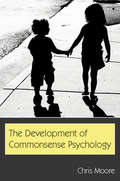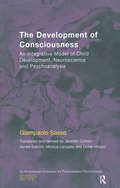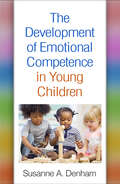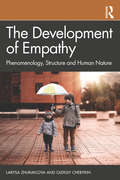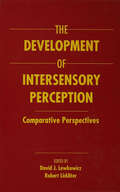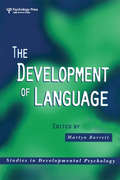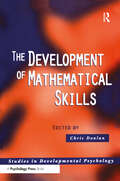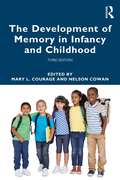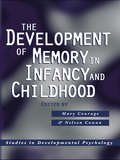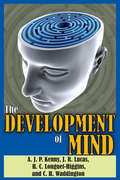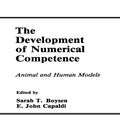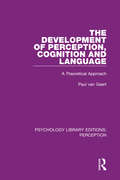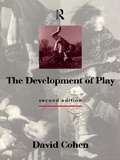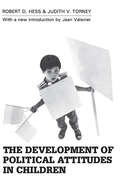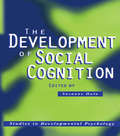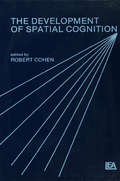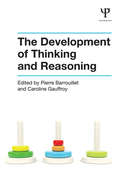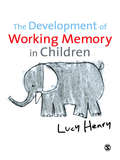- Table View
- List View
The Development of Commonsense Psychology (Developing Mind Series)
by Chris MooreHow do children develop an understanding of people as psychological entities - as feeling, thinking beings? How do they come to understand human behavior as driven by desires and informed by reason? These questions are at the heart of contemporary research on children’s "theories of mind." Although there has been an enormous amount of research on this topic, nobody - until now - has provided a coherent account that traces the development of theory of mind from birth to five years. This book begins by analyzing the nature of commonsense psychology and exploring the developmental processes relevant to its development. It then describes the manner in which the child moves from being a newborn with perceptual sensitivities to people, to an infant who can share psychological experiences with others, to a young child who can recognize people, including both self and others, as individual psychological beings. Finally, the book shows how, throughout this developmental process, the child’s social interactive experiences are used by the child to generate ever more sophisticated forms of commonsense psychology. The Development of Commonsense Psychology incorporates material from a wide range of research on early development, including infant social interaction, joint attention, self development, language development, theory of mind, and autobiographical memory. Suitable as a text for senior undergraduate/honors courses or graduate level courses in early development, the primary audience for this book is developmental psychologists. However, it is also written in a way that will make it accessible and appealing to anyone with an interest in social cognitive development in early childhood, including parents, educators, and policymakers.
The Development of Consciousness: An Integrative Model of Child Development, Neuroscience and Psychoanalysis (The\efpp Monograph Ser.)
by Giampaolo SassoThe EFPP (European Federation for Psychoanalytic Psychotherapy) promotes communication and discussion between psychotherapists across national boundaries in the child and adolescent, adult, family and group sections of the organisation, through its conferences and seminars on topics of interest in contemporary psychoanalytic psychotherapy. The organisation represents some 13,000 psychoanalytic psychotherapists in 22 countries in Western, Central and Eastern Europe and is concerned with many matters which are relevant to the profession, such as training and registration. To learn more about the EFPP conferences and activities see www.efpp.org.
The Development of Criminal and Antisocial Behavior
by Julien Morizot Lila KazemianThis edited book summarizes the current state of knowledge on the development of criminal and antisocial behavior over the life course. It focuses mainly on the developmental perspective, which has had a paradigmatic influence on current theoretical and empirical works in criminology. With a multidisciplinary perspective, the book reviews: (a) the fundamental concepts of developmental criminology; (b) the risk factors and developmental processes related to the most salient personal (e. g. , genetics, personality) and environmental (e. g. , family, peers, school) domains explaining the development of criminal and antisocial behavior; (c) the developmental issues related to a number a special themes (e. g. , women criminality, street gangs) and (d) the applied and policy implications of research in developmental criminology. In each chapter, prominent researchers from different disciplines such as criminology and psychology summarize the state of knowledge on a specific topic, identify the shortcomings of past research, offer recommendations for future research needs.
The Development of Emotional Competence in Young Children
by Susanne A. DenhamThis engaging, authoritative text synthesizes a vast body of research on how young children develop the ability to understand, express, and manage their emotions, as well as the impact of these capacities on relationships, school readiness, and overall well-being. Illustrated with vivid vignettes, the book explains specific ways that parents, teachers, and education systems can foster or hinder emotional competence, and reviews relevant assessments and interventions. Compelling topics include emotion regulation as both product and process, cultural variations in emotion socialization, the expression of empathy and self-conscious emotions, risk factors for delays in emotional development, and connections between emotional competence and social–emotional learning (SEL). Almost entirely new, this book replaces Susanne A. Denham's influential earlier work, Emotional Development in Young Children.
The Development of Emotional Intelligence: A Case Study (Concepts in Developmental Psychology)
by Nadja ReisslandHow do children learn about the expression and meaning of emotions – both happy and sad? This book answers questions regarding the foundation of emotional intelligence, and examines how children become emotionally literate as they are socialised into their family environment from birth to 2 years of age. These early stages are vitally important in teaching children to understand themselves and others, as well as how to relate to people, and how to adapt to and cope with their immediate surroundings. In order to examine the development of emotional intelligence, the author presents an overview of the literature on the subject and in the second part of the book presents a case study in which the concepts introduced in the first part of the book are revisited. Based on daily tape-recorded ‘conversations’ between a baby and her father, the data demonstrate how, over a two-year period, the child learns to express and understand emotions within social interactions. This capacity to reason with emotions is examined through four areas: perceiving emotion, integrating emotion, understanding emotion and managing emotion. The Development of Emotional Intelligence adds a new perspective to the theoretical debate on emotions and how they develop. It will be of great interest to psychologists and any professionals dealing with families. It will also be helpful reading for parents.
The Development of Empathy: Phenomenology, Structure, and Human Nature
by Larysa Zhuravlova Oleksiy ChebykinThis thought-provoking volume offers psychological perspectives on the formation of empathy and how this determines both antisocial and prosocial behaviors in individuals. It offers a theoretically grounded and empirically proven integrated approach, helping readers gain a holistic understanding of human nature and the need for empathic interaction between people. Larysa Zhuravlova and Oleksiy Chebykin study the evolution of empathy, peculiarities from birth to old age, and its role in the moral and spiritual development of a person. Key sections explore theoretical and methodological principles of empathy research, the genesis and development of human empathy, the phylogenetic preconditions for empathy, the psychological features of the ontogenesis of empathy, the key factors in personality development, and the experimental study of empathy. Considering a vision of a society based on empathic relationships, which could deter discrimination, help resolve environmental issues, harmonize interpersonal relationships, and resolve conflict, this new text is for advanced students of developmental and educational psychology. It will have broad appeal across academic and applied discipines in social and developmental psychology, education, the helping professions, and human development.
The Development of Intersensory Perception: Comparative Perspectives
by David J. Lewkowicz Robert LickliterThis book provides the latest information about the development of intersensory perception -- a topic which has recently begun to receive a great deal of attention from researchers studying the general problem of perceptual development. This interest was inspired after the realization that unimodal perception of sensory information is only the first stage of perceptual processing. Under normal conditions, an organism is faced with multiple, multisensory sources of information and its task is to either select a single relevant source of information or select several sources of information and integrate them. In general, perception and action on the basis of multiple sources of information is more efficient and effective. Before greater efficiency and effectiveness can be achieved, however, the organism must be able to integrate the multiple sources of information. By doing so, the organism can then achieve a coherent and unified percept of the world. The various chapters in this book examine the developmental origins of intersensory perceptual capacities by presenting the latest research on the development of intersensory perceptual skills in a variety of different species. By adopting a comparative approach to this problem, this volume as a whole helps uncover similarities as well as differences in the mechanisms underlying the development of intersensory integration. In addition, it shows that there is no longer any doubt that intersensory interactions occur right from the beginning of the developmental process, that the nature of these intersensory interactions changes as development progresses, and that early experience contributes in important ways to these changes.
The Development of Judgment and Decision Making in Children and Adolescents
by Janis E. Jacobs Paul A. KlaczynskiIn recent years, newspaper articles, television specials, and other media events have focused on the numerous hard decisions faced by today's youth, often pointing to teen pregnancy, drug use, and delinquency as evidence of faulty judgment. Over the past 10 years, many groups - including parents, educators, policymakers, and researchers - have become concerned about the decision-making abilities of children and adolescents, asking why they make risky choices, how they can be taught to be better decision makers, and what types of age-related changes occur in decision making. This book serves as a starting point for those interested in considering new ways of thinking about the development of these issues. The purpose is to bring together the voices of several authors who are conducting cutting-edge research and developing new theoretical perspectives related to the development of judgment and decision making. The Development of Judgment and Decision Making in Children and Adolescents is divided into three parts: Part I presents three distinctive developmental models that offer different explanations of "what develops" and the relative importance of different cognitive components and experiential components that may be important for developing judgment and decision making skills. Part II emphasizes the emotional, cultural, and social aspects of decision making--three topics that have been influential in the adult literature on judgment and decision making but are just beginning to be explored in the developmental area. Part III provides three examples of research that applies developmental and decision making models to practical research questions. This book is intended for the professional market or for graduate courses on decision making or cognitive or social development.
The Development of Language (Studies in Developmental Psychology)
by Martyn BarrettThis book presents a general overview of our current knowledge of language development in children. All the principal strands of language development are covered, including phonological, lexical, syntactic and pragmatic development; bilingualism; precursors to language development in infancy; and the language development of children with developmental disabilities, including children with specific language impairment. Written by leading international authorities, each chapter summarises clearly and lucidly our current state of knowledge, and carefully explains and evaluates the theories which have been proposed to account for children's development in that area.
The Development of Language Processing Strategies: A Cross-linguistic Study Between Japanese and English
by Reiko MazukaEver since the notion of explanatory adequacy was promoted by Chomsky in his 1965 Aspects, linguists and psycholinguists have been in pursuit of a psychologically valid theory of grammar. To be explanatorily adequate, a theory of grammar can not only describe the general characteristics of a language but can also account for the underlying psychological processes of acquiring and processing that language. To be considered psychologically valid, a grammar must be learnable by ordinary children (the problem of acquisition) and must generate sentences that are parsable by ordinary people (the problem of processing). Ultimately, the fields of language acquisition and processing are concerned with the same goal: to build a theory that accounts for grammar as it is acquired by children; accessed in comprehension and production of speech; and represented within the human mind. Unfortunately, these two fields developed independently and have rarely been well-informed about each other's concerns. Both have experienced past difficulties as a result. Recently, new models have been developed with full consideration to cross-linguistic diversity. Gone are many of the basic assumptions of conventional models, and in their place a variety of innovative and more flexible assumptions have emerged. However, in their attempt to address cross-linguistic issues, these processing models have yet to fully address the developmental challenge: How can a child without a stable grammar process language and still manage to acquire new grammar? This book attempts to develop a model of language processing that addresses both cross-linguistic and developmental challenges. It proposes to link the setting of a basic configurational parameter during language acquisition to the different organization of processing strategies in left- and right-branching languages. Based primarily on Mazuka's doctoral dissertation, this volume incorporates various responses to the original proposal as well as the author's responses to the comments.
The Development of Language and Language Researchers: Essays in Honor of Roger Brown
by Frank S. KesselFirst published in 1988. This is a collection of essays that were presented at or generated afterwards at a meeting on language acquisition Society Development in April 1981: a symposium on “The Development of Language and Language Researchers: Whatever Happened to Linguistic Theory?” in Boston.
The Development of Mathematical Skills (Studies in Developmental Psychology)
by Chris DonlanCurrent research into the psychology of children's mathematics is extremely diverse. The present volume reflects this diversity; it is unique in its breadth, bringing together accounts of cutting-edge research from widely differing, sometimes opposing viewpoints. The reader with a grounding in developmental psychology but no knowledge of mathematical development will enjoy a wide ranging and challenging summary of current trends. Those already familiar with some of the work may take the opportunity to broaden their knowledge and to evaluate new methodologies and the insights they offer.The book is an invitation to explore a complex set of phenomena for which no unitary explanation can be offered. It aims to show that apparently disparate research perspectives may be complementary to each other; and to suggest that progress towards a comprehensive account of mathematical skills may require a broad-based understanding of research from more than one viewpoint.
The Development of Memory in Infancy and Childhood
by Mary L. CourageThe Development of Memory in Infancy and Childhood provides a thorough update and expansion of the previous edition and offers new research on significant themes and ideas that have emerged in the past decade such as the cognitive neuroscience of memory development, autobiographical memory and infantile amnesia, and the cognitive and social factors that underlie memory for events. In this volume, Courage and Cowan bring together leading international experts to review the current state of the science of memory development in their own research areas. They note questions of theory and basic science addressed in their research, highlight the real-world applications of those findings, and propose an agenda for future research. The book also considers the implications of their work for the development of atypical children, specifically, how these new findings might be adapted to enrich the lives of those children and to inform and validate our current expectations of individual differences in the development of typical children. The first of three groups of chapters focuses on basic neurobiological, perceptual, and cognitive processes that underlie memory and its development (i.e., encoding, consolidation and storage, retrieval). The second group focuses primarily on the social, contextual, and cultural factors that enable, shape, and mediate these basic processes, while the rest of the chapters focus on practical applications of this knowledge to real-world settings and issues. The book provides a new look at memory development, including new topics such as spatial representation and spatial working, prospective memory, false memories, and memory and culture. This classic yet contemporary volume will appeal to senior undergraduate and graduate students of developmental and cognitive psychology, as well as to developmental psychologists who want a compendium of key topics in memory development.
The Development of Memory in Infancy and Childhood (Studies in Developmental Psychology)
by Nelson Cowan Mary L. CourageHuman memory is not only the repository of our past but the essence of who we are. As such, it is of enduring fascination. We marvel at its resilience in some situations and its fragility in others. The origin of this extraordinary cognitive capacity in infancy and childhood is the focus of vigorous research and debate as we seek to understand the record of our earliest beginnings. The first edition of this volume, The Development of Memory in Childhood, documented the state-of-the-art science of memory development a decade ago. This new edition, The Development of Memory in Infancy and Childhood, provides a thorough update and expansion of the previous text and offers reviews of new research on significant themes and ideas that have emerged since then. Topics include basic memory processes in infants and toddlers, the cognitive neuroscience of memory development, the cognitive and social factors that underlie our memory for implicit and explicit events, autobiographical memory and infantile amnesia, working memory, the role of strategies and knowledge in driving memory development, and the impact of stress and emotion on these basic processes. The book also includes applications of basic memory processes to a variety of real world settings from the courtroom to the classroom. Including contributions from many of the best researchers in the field, this classic yet contemporary volume will appeal to senior undergraduate and graduate students of developmental and cognitive psychology as well as to developmental psychologists who want a compendium of current reviews on key topics in memory development.
The Development of Mind
by William McCordThe experimental and highly regarded Gifford Lectures at Edinburgh University was endowed in the late nineteenth century. Over the years, participants have including many leading representatives of religion, science, and philosophy. This series has as its subject, The Development of Mind. First published in 1972, the series continues to attract widespread interest. In this volume, contributors argue about the mind from diverse analytical standpoints.The focus of the series remains the relationship between religion, science, and philosophy. This volume attempts to achieve a comprehensive view of the subject of mind. The mental development of children in the light of modern psychology is discussed, and the distinction between "how" and "why" questions is put forward with clarity. The development of mind is further contrasted with the evolution of embryos in the young. The mind is considered as a capacity for intellectual activity, and as a multi-purpose program. Goal-directed behavior and language development are given importance, and issues of cosmic purpose, and the how and why of evolution, are never far from the surface of the argument.The lecturers know their opposition and their positions, and the cut-and-thrust of the discussion has much acumen and wit to it. Issues ranging from the impact of mind on theories of religion, causation, and rational will are examined in an informal, yet compelling, manner.
The Development of Numerical Competence: Animal and Human Models (Comparative Cognition and Neuroscience Series)
by Sarah T. Boysen E. John CapaldiThe area of animal counting has historically been the subject of a long and colorful debate, but only more recently have systematic, more rigorous experimental efforts to evaluate numerical abilities in animals been undertaken. This volume contains chapters from investigators in a range of disciplines with interests in comparative cognition. The studies described characterize the emergence of number-related abilities in rats, pigeons, chimpanzees, and humans, bringing together -- for the first time in one volume -- the rich diversity of cognitive capabilities demonstrated throughout many species. The data and theoretical perspectives shared will likely serve to provoke much thought and discussion among comparative psychologists and fuel new research and interest in the field of animal cognition.
The Development of Perception, Cognition and Language: A Theoretical Approach (Psychology Library Editions: Perception #9)
by Paul van GeertOriginally published in 1983, the aim of this book was to discuss some fundamental problems of cognitive developmental psychology at the time. The theme which underlies the discussion is that scientific knowledge of the cognitive characteristics of other people starts from the cognitive instruments that we psychologist employ, viz. our theories, models, assumptions, methods of enquiry etc. Thus our scientific cognitive equipment not only provides the format in which cognition in other people is expressed, it also exemplifies, in some abstract sense, this cognition. The first part of the book deals with the concept of development in relation to the structure of developmental theories. It is argued that theories originate from (implicit) conceptual analyses of (implicit) final state definitions. Starting from this specific view on the nature of developmental theories, the second part of the book discusses perception and perceptual development.
The Development of Personality (Collected Works of C. G. Jung)
by C.G. JungThough Jung's main researches have centred on the subject of individuation as an adult ideal he has a unique contribution to make to the psychology of childhood. Jung repeatedly underlined the importance of the psychology of parents and teachers in a child's development and he emphasized that an unsatisfactory psychological relationship between parents may be an important cause of disorders in childhood. He maintained that all real education of children needs teachers who not only know how to learn but who can also develop their own personalities. Jung devotes a large part of the book to expounding his views on these important subjects. There is also an outline of the theory of child development, a delightful snapshot from the life of a girl called Anna and her parents, and a stimulating discussion of marriage as a psychological relationship. Finally there is a chapter on child development and individuation.
The Development of Play
by David CohenPlay is an important part of our development. In playing, we learn to move, think, speak and imagine, as well as cope with other people. This second edition of The Development of Play addresses these key functions that play serves. David Cohen examines how children play with objects, with language, and most importantly, with each other and their parents. He goes on to ask why we stop playing, and looks at adult games. The Development of Play argues that psychology has accepted too uncritically the Victorian opposition of work and play, and argues that adults can learn to play more. With its extensive account of recent work in this area, this book is the most up-to-date work on the importance of play and will be of interest to child psychologists, developmental psychologists, and a wide number of professionals involved with children.
The Development of Political Attitudes in Children
by Judith V. Torney-PurtaBased on a study of 12,000 elementary school children in eight large and medium-sized American cities, this book presents the first large-scale study of political attitude formation in children. The authors view political development from the perspective of a general theory of socialization, and compare the influences of social class, intelligence, teacher attitude, and religious membership on the growth of political attitudes. The book outlines the way in which the child's political awareness evolvesfrom identification with authority figures such as father, policeman, the president, to a grasp of more abstract political concepts and the rudiments of political participation. Illuminating a topic of great theoretical concern and practical educational importance, the book is a significant contribution to the fields of political sociology, child development and educational psychology, and an important reference work for all concerned with the processes of socialization and of attitude formation in general. The Development of Political Attitudes in Children was based on a major survey, the first of its kind, begun at the University of Chicago in 1960 to as certain information about the induction of children into the political life of the United States, to describe the nature of socialization into citizenship roles, and to examine pre-adult political learning and behavior in terms of other implications for the stability of the political system.
The Development of Social Cognition (Studies in Developmental Psychology)
by Suzanne HalaThe Development of Social Cognition presents a lively, up-to-date examination of both the classical issues and contemporary understanding of theory and research in social cognitive development. The initial chapters highlight one of the central, theoretical tensions in the field, which is whether the development of understanding people is fundamentally different from understanding things. Subsequent chapters are devoted to development across specific areas of social cognition from infancy through to adolescence. The text ends with a comprehensive examination of the development of moral aspects of social cognition.
The Development of Social Cognition and Communication
by Catherine S. Tamis-LeMonda Bruce D. HomerFor young children, two of the most important tasks they face are learning how to communicate and learning how to think about themselves and the social world around them. The premise of this book is that these two tasks are inherently linked. The communicative routines and language that children learn enable new modes of cognition, which in turn allow for more complex social interactions. The model of early child development that emerges is one in which equal importance is given to the socio-cultural context in which children are developing, and to the role played by children in actively constructing their own knowledge. The book is organized into four thematic sections, each introduced by an integrative overview. The first section, "Language and Cognition," examines the function of language in young children's lives. The second section, "Intentionality and Communication," explores young children's understanding of intentions and their verbal and non-verbal communication. The third section, "Theory of Mind and Pedagogy," examines the ways in which developments in cognitive and communicative skills transform children's participation in the process of teaching and learning. The final section, "Narrative and Autobiographical Memory," looks at the effects of narrative on young children's understanding of themselves and their world. This book will be of great interest to anyone concerned with young children's learning and development.
The Development of Spatial Cognition
by Robert CohenFirst published in 1985. Routledge is an imprint of Taylor & Francis, an informa company.
The Development of Thinking and Reasoning
by Pierre Barrouillet Caroline GauffroyThinking and reasoning are key activities for human beings. In this book a distinguished set of contributors provides a wide readership with up-to-date scientific advances in the developmental psychology of thinking and reasoning, both at the theoretical and empirical levels. The first part of the book illustrates how modern approaches to the study of thinking and reasoning have gone beyond the Piagetian legacy: through the investigation of avenues previously not explored, and by demonstrating that young children have higher capacities than was assumed within the Piagetian tradition. The second part focuses upon theoretical and empirical investigations of the interplay between logic and intuition in reasoning and decision making, and how these forms of thinking evolve with age, through the general framework of what is known as dual-process theories. Contrary to Piaget’s claim, it becomes apparent that elaborate adult reasoning could rely on some form of intuition. The Development of Thinking and Reasoning provides psychologists, educators and everyone interested in child development with an integrated and up-to-date series of chapters, written by prominent specialists in the areas of thinking, reasoning, and decision making.
The Development of Working Memory in Children (Discoveries & Explanations in Child Development)
by Dr Lucy HenryUsing the highly influential working memory framework as a guide, this textbook provides a clear comparison of the memory development of typically developing children with that of atypical children. The emphasis on explaining methodology throughout the book gives students a real understanding about the way experiments are carried out and how to critically evaluate experimental research.<P><P> The first half of the book describes the working memory model and goes on to consider working memory development in typically developing children. The second half of the book considers working memory development in several different types of atypical populations who have intellectual disabilities and/or developmental disorders. In addition, the book considers how having a developmental disorder and/or intellectual disabilities may have separate or combined effects on the development of working memory. <P> The Development of Working Memory in Children is for undergraduate and postgraduate students taking courses in development/child psychology, cognitive development and developmental disorders.
